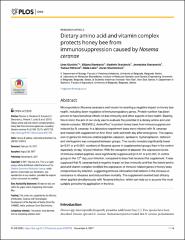| dc.description.abstract | Microsporidium Nosema ceranae is well known for exerting a negative impact on honey bee
health, including down-regulation of immunoregulatory genes. Protein nutrition has been
proven to have beneficial effects on bee immunity and other aspects of bee health. Bearing
this in mind, the aim of our study was to evaluate the potential of a dietary amino acid and
vitamin complex “BEEWELL AminoPlus” to protect honey bees from immunosuppression
induced by N. ceranae. In a laboratory experiment bees were infected with N. ceranae
and treated with supplement on first, third, sixth and ninth day after emergence. The expression
of genes for immune-related peptides (abaecin, apidaecin, hymenoptaecin, defensin
and vitellogenin) was compared between groups. The results revealed significantly lower
(p<0.01 or p<0.001) numbers of Nosema spores in supplemented groups than in the control
especially on day 12 post infection. With the exception of abacein, the expression levels
of immune-related peptides were significantly suppressed (p<0.01 or p<0.001) in control
group on the 12th day post infection, compared to bees that received the supplement. It was
supposed that N. ceranae had a negative impact on bee immunity and that the tested amino
acid and vitamin complex modified the expression of immune-related genes in honey bees
compromised by infection, suggesting immune-stimulation that reflects in the increase in
resistance to diseases and reduced bee mortality. The supplement exerted best efficacy
when applied simultaneously with Nosema infection, which can help us to assume the most
suitable period for its application in the hive | en_US |

